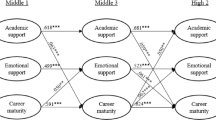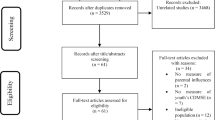Abstract
Relationships between career maturity and self-concept, parenting style and individualism–collectivism across Australian and Thai cultural contexts were investigated. Berry’s (1969) etic-emic model for adapting instruments for cross-cultural research was applied. Derived etic status was achieved for the career planning scale, five self-concept sub-scales and the Parental Bonding Instrument. Mean score comparisons revealed few significant differences between Australia and Thailand. None of the independent variables were associated with Thai career planning. Academic and social self-concept scales and father care were related to career planning in Australia. Implications are discussed.
Résumé
L’influence du concept de soi, du style parental et de l’individualisme-collectivisme sur la maturité vocationnelle en Australie et en Thailande. Les relations entre la maturité vocationnelle et le concept de soi, le style parental et l’individualisme-collectivisme au travers des contextes culturels australien et thaï ont été investigués. Le modèle “étique-émique” de Berry (1969) d’adaptation des instruments pour la recherche interculturelle a été appliqué. Le statut étique dérivé a été atteint pour l’échelle de la planification de carrière, pour les cinq sous-échelles du concept de soi et pour l’Instrument de Lien Parental. Les comparaisons des scores moyens ont révélé peu de différences significatives entre l’Australie et la Thailande. Aucune des variables indépendantes étaient associées avec la planification de carrière thaï. Les échelles du concept de soi académique et social ainsi que l’attention du père était reliées à la planification de carrière en Australie. Les implications sont discutées.
Zusammenfassung
Der Einfluss des Selbstkonzepts, Erziehungsstils und Individualismus-Kollektivismus auf Berufswahlreife in Australien und Thailand. Die Beziehungen zwischen Berufswahlreife und Selbstkonzept, Erziehungsstil und Individualismus-Kollektivismus im australischen und thailändischen kulturellen Kontext wurden untersucht. Berrys (1969) etisch-emisches Modell für die Anpassung von Instrumenten für interkulturelle Forschung wurde angewandt. Abgeleiteter etischer Status wurde für die Skala der Karriereplanung, die fünf Selbstkonzept Subskalen und das Instrument der elterlichen Bindung erreicht. Mittelwertsvergleiche zeigten wenig signifikante Unterschiede zwischen Australien und Thailand. Keine der unabhängigen Variablen waren mit thailändischer Karriereplanung verbunden. Skalen des akademischen und sozialen Selbstkonzepts sowie Zuwendung des Vaters hingen mit Karriereplanung in Australien zusammen. Implikationen werden besprochen.
Resumen
Influencia del auto-concepto, el estilo educativo de los padres, y del individualismo-colectivismo sobre la madurez vocacional en Australia y Tailandia. Se investigaron las relaciones entre la madurez vocacional y el auto-concepto, el estilo educativo de los padres y el individualismo-colectivismo en contextos culturales australianos y tailandeses. Se aplicó el modelo de Berry (1969) etic (punto de vista del investigador) - emic (émico-punto de vista del nativo) usado para adaptar instrumentos a la investigación multicultural. Se obtuvo un estatus etic en la escala de planificación de la carrera, cinco sub-escalas del auto-concepto y el instrumento de de vínculos parentales. Las comparaciones de medias produjeron pocas diferencias significativas entre Australia y Tailandia. Ninguna de las variables independientes se asoció con la planificación de la carrera en Tailandia. Las escalas de auto-concepto académico y social, y el cuidado paterno se relacionaron con la planificación de la carrera en Australia. Se discuten las implicaciones del estudio.
Similar content being viewed by others
References
Australian Bureau of Statistics. (2006). A picture of the nation: The statistician’s report on the 2006 census. Cat. No. 207. Retrieved from http://www.abs.gov.au/ausstats/abs@nsf/mf/207
Berry, J. W. (1969). On cross-cultural comparability. International Journal of Psychology, 4, 119–128. doi:1.1080/00207596908247261.
Berry, J. W., Poortinga, Y. H., Segall, M. H., & Dasen, P. R. (1992). Cross-cultural psychology: Research and applications. New York, NY: Cambridge University Press.
Hartung, P. J., Speight, J. D., & Lewis, D. M. (1996). Individualism-collectivism and the vocational behavior of majority culture college students. The Career Development Quarterly, 45, 87–96.
Herz, L., & Gullone, E. (1999). The relationship between self-esteem and parenting style. Journal of Cross-Cultural Psychology, 30, 742–761. doi:1.1177/0022022199030006005.
Hofstede, G. (1980). Culture’s consequences: International differences in work-related values. Beverley Hills, CA: Sage.
Hughes, C., & Thomas, T. (2006). Adapting the career development inventory-Australia for cross-cultural research. Journal of Vocational Behavior, 69, 276–288. doi:1.1016/j.jvb.2006.05.008.
Keller, B. K., & Whitson, S. C. (2008). The role of parental influences on young adolescents’ career development. Journal of Career Assessment, 16, 198–217. doi:1.1177/106907270731320.
Kerka, S. (2000). Parenting and career development (ERIC Digest No. 214). Columbus, OH: Clearing House on Adult, Career, and Vocational Education. Retrieved from http://www.eric.ed.gov/PDFS/ED440251.pdf.
Kuhn, M. H., & McPartland, T. S. (1954). An empirical investigation of self-attitudes. American Sociological Review, 19, 68–76. doi:1.2307/2088175.
Leong, F. T. L., & Serafica, F. C. (2001). Cross-cultural perspective on Super’s career development theory: Career maturity and cultural accommodation. In F. T. L. Leong & A. Barak (Eds.), Contemporary models in vocational psychology: A volume in honor of Samuel H. Osipow (pp. 167–205). Mahwah, NJ: Lawrence Erlbaum Associates.
Lokan, J. (1984a). Career development inventory Australia manual. Hawthorn: Australian Council of Educational Research.
Lokan, J. (1984b). Career development inventory Australia. Hawthorn: Australian Council of Educational Research.
Markus, H. R., & Kitayama, S. (1991). Culture and the self: Implications for cognition, emotion, and motivation. Psychological Review, 2, 224–253. doi:1.1037/0033-295x.98.2.224.
Marsh, H. W. (1992). Self-description questionnaire II: Manual. Macarthur: Publication Unit, Faculty of Education, University of Western Sydney.
Marsh, H. W., & Peart, N. D. (1988). Competitive and cooperative physical fitness training programs for girls: Effects on physical fitness and multidimensional self-concepts. Journal of Sport and Exercise Psychology, 10, 390–407.
Murphy, E., Brewin, C. R., & Silka, L. (1997). The assessment of parenting using the parental bonding instrument: Two or three factors? Psychological Medicine, 27, 333–342. doi:1.1017/S0033291796004606.
Palmer, S., & Cochran, L. (1988). Parents as agents of career development. Journal of Counseling Psychology, 35, 71–76. doi:1.1037/0022-0167.35.1.71.
Parker, G., Tupling, H., & Brown, L. B. (1979). A parental bonding instrument. British Journal of Medical Psychology, 52, 1. doi:1.1111/j.2044-8341.1979.tb02487.x.
Patton, W., & McMahon, M. (2006). Career development and systems theory: Connecting theory and practice (2nd ed.). Rotterdam, The Netherlands: Sense Publishers.
Rigby, K., Slee, P. T., & Martin, G. (2007). Implications of inadequate parental bonding and peer victimization for adolescent mental health. Journal of Adolescence, 30, 801–812. doi:1.1016/j.adolescence.2006.09.008.
Rosiman, G. I., Bahadur, M. A., & Oster, H. (2000). Infant attachment security as a discriminant predictor of career development in late adolescence. Journal of Adolescent Research, 15, 531–545. doi:1.1177/0743558400155001.
Rossier, J. (2005). A review of the cross-cultural equivalence of frequently used personality inventories. International Journal for Educational and Vocational Guidance, 5, 175–188. doi:1.1007/s10775-005-8798-x.
Shavelson, R. J., Hubner, J. J., & Stanton, G. C. (1976). Self-concept: Validation of construct interpretations. Review of Educational Research, 46, 407–441. doi:1.3102/00346543046003407.
Super, D. E. (1953). A theory of vocational development. The American Psychologist, 8, 185–190. doi:1.1037/h0056046.
Super, D. E. (1963). Self concepts in vocational development. In D. E. Super, R. Starishevesky, N. Matlin, & J. P. Jordaan (Eds.), Career development: Self concept theory (pp. 1–16). New York: College Entrance Examination Board.
Super, D. E. (1980). A life-span, life-space approach to career development. Journal of Vocational Behavior, 16, 282–298. doi:1.1016/0001-8791(80)90056-1.
Super, D. E. (1983). Assessment in career guidance: Toward truly developmental counseling. The Personnel and Guidance Journal, 61, 555–562.
Super, D. E. (1990). A life-span, life-space approach to career development. In D. Brown & L. Brooks (Eds.), Career choice and development: Applying contemporary theories to practice (2nd ed., pp. 197–261). San Francisco, CA: Jossey-Bass Inc.
Super, D. E., Savickas, M. L., & Super, C. M. (1996). The life-span, life-space approach to careers. In D. Brown & L. Brooks (Eds.), Career choice and development (3rd ed., pp. 121–178). San Francisco, CA: Jossey-Bass Inc.
Tabachnick, B. G., & Fidell, L. S. (2007). Using multivariate statistics (5th ed.). Boston, MA: Allyn and Bacon.
Ten Berge, J. M. F. (1986). Rotation to perfect congruence and the cross-validation of component weights across populations. Multivariate Behavioral Research, 21, 41–64. doi:1.1207/s15327906mbr2101_3.
Triandis, H. C. (1994). Culture and social behavior. New York, NY: McGraw-Hill.
Triandis, H. C. (1995). Individualism and collectivism. Boulder, CO: Westview Press.
Triandis, H. C., McCusker, C., & Hui, C. H. (1990). Multimethod probes of individualism and collectivism. Journal of Personality and Social Psychology, 59, 1006–1020.
Uji, M., Tanaka, N., Shono, M., & Kitamura, T. (2006). Factorial structure of the parental bonding instrument (PBI) in Japan: A study of cultural, developmental, and gender influences. Child Psychology and Human Development, 37, 115–132. doi:1.1007/s10578-006-0027-4.
Van de Vijver, F. J. R., & Leung, K. (1997). Methods and data analysis for cross-cultural research. Thousand Oaks, CA: Sage Publications Inc.
Wallace-Broscious, A., Serafica, F. C., & Osipow, S. H. (1994). Adolescent career development: Relationships to self-concept and identity status. Journal of Research on Adolescence, 4, 127–149. doi:1.1207/s15327795jra0401_7.
Werner, O., & Campbell, D. (1970). Translating, working through interpreters, and the problem of decentring. In R. Naroll & R. Cohen (Eds.), A handbook of method in cultural anthropology (pp. 398–420). New York, NY: Natural History Press.
Acknowledgements
The author wishes to acknowledge the support of the National Research Council of Thailand and the Ministry of Education in Thailand and the Australian Government, Catholic Education and Independent schools who participated in this research. The expert advice provided by Professor Trang Thomas, Dr. Sophie Xenos and Associate Professor John Reece, Professor Chancha Suvannathat, Professor Pongpan Kirdpitak, Dr. Kamonpan Boonkit and Dr. Meechai Iemjinda is greatly appreciated.
Author information
Authors and Affiliations
Corresponding author
Rights and permissions
About this article
Cite this article
Hughes, C. The influence of self-concept, parenting style and individualism–collectivism on career maturity in Australia and Thailand. Int J Educ Vocat Guidance 11, 197–210 (2011). https://doi.org/10.1007/s10775-011-9208-1
Received:
Accepted:
Published:
Issue Date:
DOI: https://doi.org/10.1007/s10775-011-9208-1




